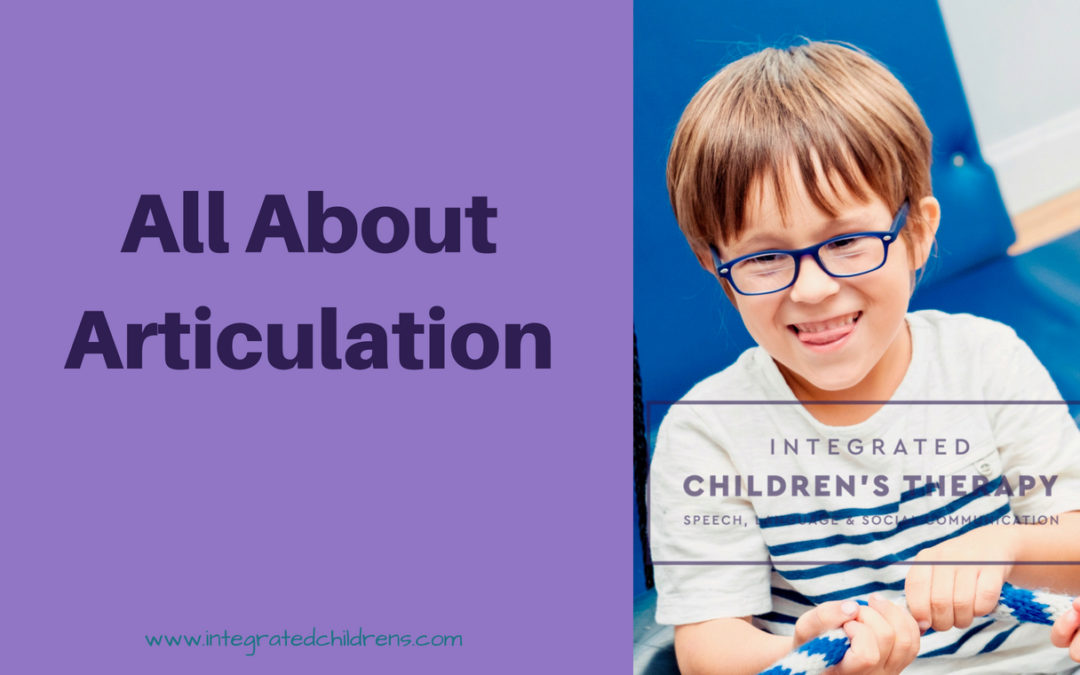What is Articulation?
Articulation is the way we use our tongue, lips, jaw, teeth and palate to make speech sounds. It’s the key to pronouncing words correctly so we can communicate clearly and effectively.
What are Articulation Errors?
There are four types of articulation errors:
- Substitutions — A child substitutes one sound for another. For example, wabbit instead of rabbit.
- Omissions — A child leaves a sound out of a word. For example, geen instead of green.
- Additions — A child adds sounds to a word. For example, buhlack instead of black.
- Distortions — A child changes a speech sound, such as when a lisp distorts the ’s’ sound: (thun instead of sun).
It’s normal for children to make speech errors when they’re learning how to talk. But, if they don’t master certain sounds by certain ages, it’s a good idea to check in with a pediatric speech-language pathologist (SLP). Articulation challenges can cause frustration for both the speaker and listener, and can negatively impact self esteem, relationships, school performance, and social interactions.
Articulation Milestones
90% of children master speech sounds as follows:
- By age 3 – p, m, h, n, w
- By age 4 – b, k, g, d, t, f, kw
- By age 5 – ng, bl
- By age 6 – r, l, s, ch, sh, v, br, dr, fl, fr, tr, gl, gr, kl, kr, pl, st
- By age 7 – z, j, sl, sp, sw
- By age 8 – th in the middle of words (bathroom, birthday)
Red Flags for Articulation Problems
- Delayed babbling, or did not babble at all
- Delayed speech
- Lagging behind on articulation milestones
- History of ear infections
- Uses mostly vowels or makes vowel errors
- Difficult to understand by strangers at age 3
- Deletes first or last sounds of a word after age 3
- Not fully intelligible by age 4
- Consistently gets frustrated when trying to communicate and isn’t understood
- Food and/or drinks spill out of mouth
- Prolonged bottle or pacifier use
- History of thumb sucking
- Excessive drooling
What Causes Articulation Problems?
The majority of articulation problems have no clear cause, but certain factors may increase the likelihood of developing them, including:
- Family history of speech problems
- Hearing loss (from chronic ear infections, for instance)
- Problems with the mouth (such as cleft palate or weak oral muscles)
- Developmental delays
- Neurological disorders (like cerebral palsy)
- Genetic syndromes (down syndrome, for instance)
How You Can Help at Home
- Ask your child’s SLP for specific activities to do with your child that align with therapy goals.
- Keep it positive! Articulation challenges can be tough on a child’s self-esteem. When doing “therapy homework,” keep it upbeat and encouraging.
- Praise, praise, praise. Anytime your child says a target sound correctly, acknowledge it and her efforts: “Wow! I heard you say ’s’ a new way. You’ve been working hard on that!”
- Model correct speech. As part of daily conversation, repeat back correctly the sounds your child says wrong. If she says, “I see free birds,” you can reply with, “Oh, you see three birds?” This, rather than directly correcting her errors, is a natural, positive way to model speech sounds.
- Spend time communicating with your child. Take advantage of opportunities to verbally interact. Chat in the car, play “I Spy” while you’re preparing dinner, join your child while she plays, and sing songs together. Use these opportunities to encourage her to repeat sounds and words.
- Read to your child every day. Stories with rhyme and repetition (such as Dr. Seuss books) are especially helpful.
If you’re concerned about your child’s articulation, please give us (or a skilled SLP in your area) a call!


Recent Comments